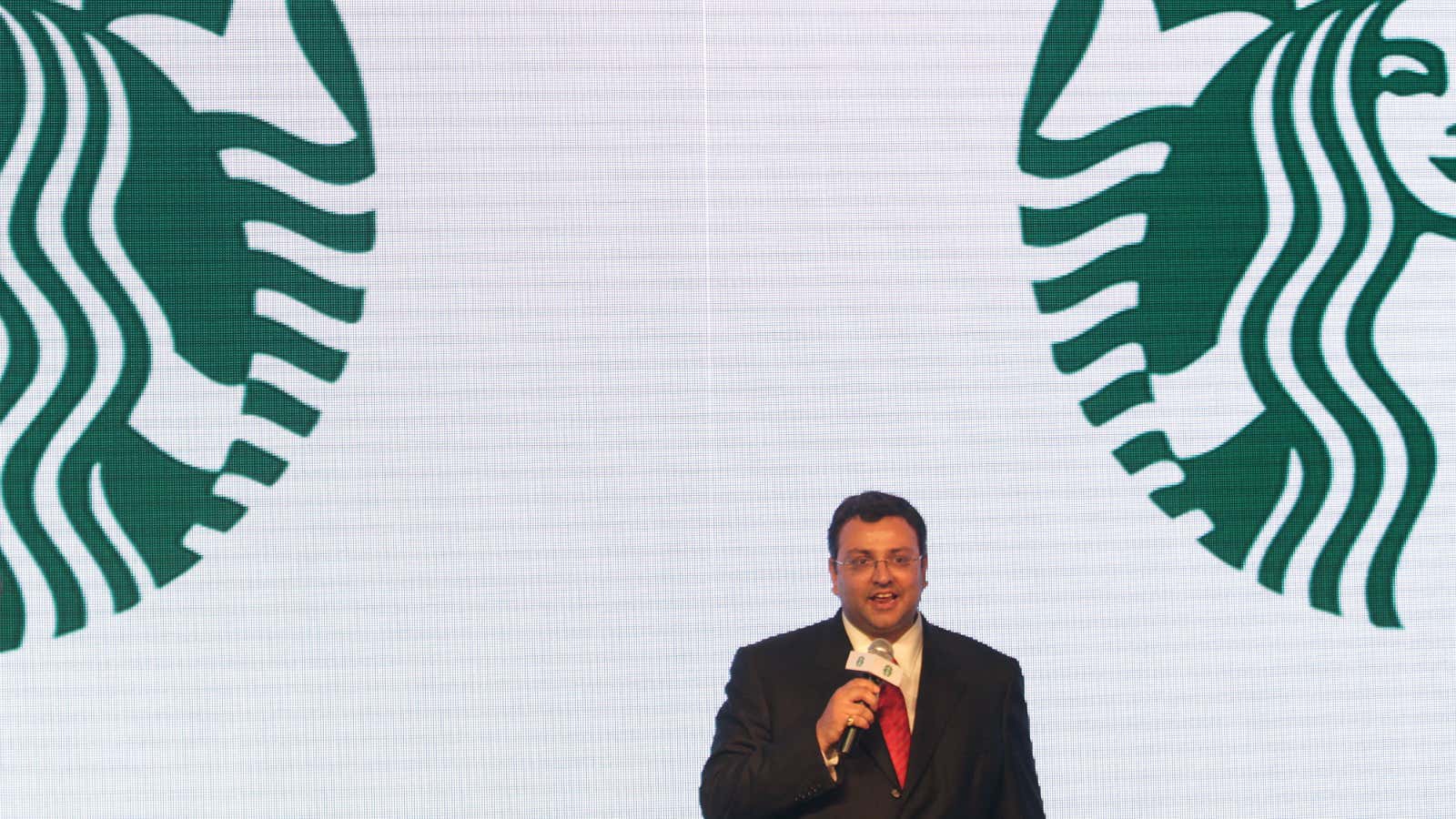Four years ago, when Cyrus Mistry took control of the Tata Group, the $103-billion salt-to-steel conglomerate was in the throes of recasting its retail business.
It had made some tentative early moves. In 2012, the Tatas partnered with coffee chain Starbucks for its India entry. A year later, the group converted its long-held franchise agreement with British retailer Tesco to run the Star Bazaar chain of hypermarkets through a joint venture.
Since then, India’s $600-billion retail marketplace has been wracked by disruption, especially with the rise of e-commerce companies like Amazon, Flipkart, and Snapdeal that have changed the ecosystem. Amidst this transition, Tata group companies have slowly jumped onto the online bandwagon, but it’s still a long road ahead.
In all, under Mistry’s watch, the performance of the retail businesses have been a mixed bag. Some of its foreign joint ventures, like the one with Spanish retailer Zara (formed in 2009), are raking in money while others like Star Bazaar are now getting more aggressive about new stores.
Here’s a look at some of Tata Sons’ retail businesses over the last four years:
- Titan: The country’s largest watch company, Titan that also owns jewellery brand Tanishq, has had a choppy year, thanks in part to the government’s decision to clamp down on high-value cash transactions and a tepid demand for gold in Asia’s third-largest economy. The Bengaluru-based company registered a turnover of Rs11,176 crore in 2015, down 5.2% from the previous year. While investors are cautious about the slump, the company has taken some corrective measures. Earlier this year, it bought a majority stake in online jewellery retailer CaratLane and announced its entry into other categories such as women’s apparel.
- Tata Global Beverages/Starbucks: Starbucks entered India in October 2012 through a 50:50 joint venture (JV) with Tata Global Beverages (which also owns brands such as Himalaya mineral water and Tetley Tea). Four years and a new CEO later, Starbucks today has over 80 stores in the country. For the year ending March 2015, it posted a total revenue of Rs171.2 crore, an 80% jump from the previous year. Yet, the coffee chain’s growth in India pales in comparison to that in markets such as China where Starbucks has promised to open as many as 5,000 outlets by 2021.
- Trent: The group’s retail mainstay hosts a range of shopping formats such as departmental store Westside, supermarket store Star Bazaar (a JV with Britain’s Tesco), and Spanish fashion brand Zara. Headed by Noel Tata (once thought to be in running for Mistry’s job), Trent registered a turnover (pdf) of Rs1,552.69 crore for the year ended March 31, 2016, up 10% from Rs1,405 crore a year ago. Zara alone has clocked a revenue of Rs842 crore in the same period. Yet, the retail venture has been stifled by increasing competition from online businesses over the past three years. Mistry had been instrumental in pivoting the company’s move to digitally-enabled businesses through Tata UniStore, the parent company that manages online shopping portals such as TataCLiQ.com.
- TataCLiQ: In May 2016, Tata Sons finally logged online to sell clothes, appliances, and footwear. Most Indian brick & mortar retailers have been late to adapt to e-commerce, losing in-store sales to online retailers such as Amazon and Flipkart. Tata, too, woke up to the $16-billion e-retail market, joining other conglomerates such as Reliance Industries and the Aditya Birla Group in expanding online.
- Infiniti Retail/Croma: Croma, the group’s 100-store electronics retail chain, witnessed a choppy two years as more consumers bought electronics online. Last July, though, Croma, which is part of Infiniti Retail, swung back to action as it sought to integrate its online and offline sales. But the chain has announced plans to focus on the profitability of existing stores before expanding further, suggesting a long and hard road ahead.
